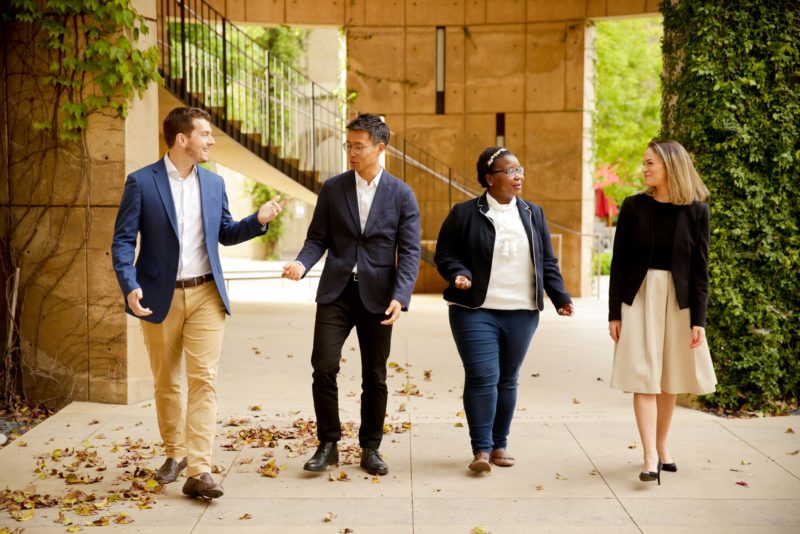The Global Lawyer: Preparing JDs for International Practice
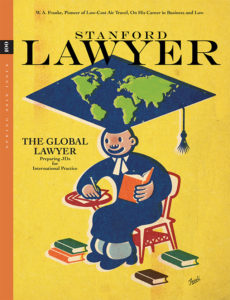
Students filled classroom 180 in early January—all eager to hear a pitch about the Global Quarter that is at the core of the new W.A. Franke Global Law Program. They didn’t need much persuading—the program sold itself, interest in it far outpacing spaces available. • In April, 25 law students were notified that they will be inaugural Franke Fellows, a cohort that will be part of the first Global Quarter in winter 2020—immersed in international business law and finance with the aim of exposing them to international practice and the issues, problems, and challenges that often accompany complex cross-border questions. • “It seemed like it was literally just written for me,” says Aletha Smith, JD ’20. “I was really excited to see that there was a program that was designed more towards international corporate work.” Smith, a Franke Fellow, is part of a growing group of law students who recognize the changing international nature of the world—and legal practice—and feel an urgent need to gain some experience in international business law while still studying. • During the quarter, Franke Fellows will take a condensed seven-week course load covering corporations, commercial law, capital markets, corporate finance, comparative accounting, and what is now a foundational class for the Global Quarter: International Business Transactions, Regulation and Litigation. They’ll also dive into issues of public policy and globalization during a seminar exploring the legal, financial, and corporate governance systems of Japan, China, and Singapore. They will then continue the learning experience during three weeks of intensive field study that will take them from Singapore to Hong Kong to mainland China and Japan.
“Our graduates will have an educational experience that reflects the global world we live in, and they will be ready to lead in an increasingly complex and borderless world,” says M. Elizabeth Magill, Stanford Law dean from September 2012 until April 1 of this year.
Throughout her nearly seven years leading Stanford Law, Magill worked steadily on bolstering international aspects of the curriculum, including weaving cross-border issues into key classes and adding field study trips to China, Brazil, France, and elsewhere. These elements now come together with the establishment of the W.A. Franke Global Law Program, which both creates an umbrella under which many of the law school’s global initiatives now sit and establishes new opportunities through the Global Quarter, an immersive learning experience focused on international law and business.
“I’m excited by the law school’s vision to make Stanford Law a true incubator for the next generation of global leaders,” says William A. Franke, LLB ’61 (BA ’59), who established the program with a gift to the law school, the largest alumni gift in its history. “My hope is that this program will add a layer of global preparedness to the education offered at Stanford and will help continue the tradition of sending SLS graduates into the world able to tackle pressing issues and add value in the global arena.” (Click this link for the Magill interview with Franke.) “We are profoundly grateful for this extraordinary investment, which will allow us to permanently transform the educational experience at Stanford Law School,” says Magill.
“Our students will spend time abroad working with foreign law students, attorneys, business people, and government regulators looking at a series of problems from the perspective of a foreign company or regulator. This will give them an experience that we can’t replicate in the classroom,” says Robert Daines, Pritzker Professor of Law and Business and associate dean for global programs. Daines worked closely with Magill, key faculty, and alumni practitioners to develop the Global Quarter and design the foundational course, which he has co-taught each year.
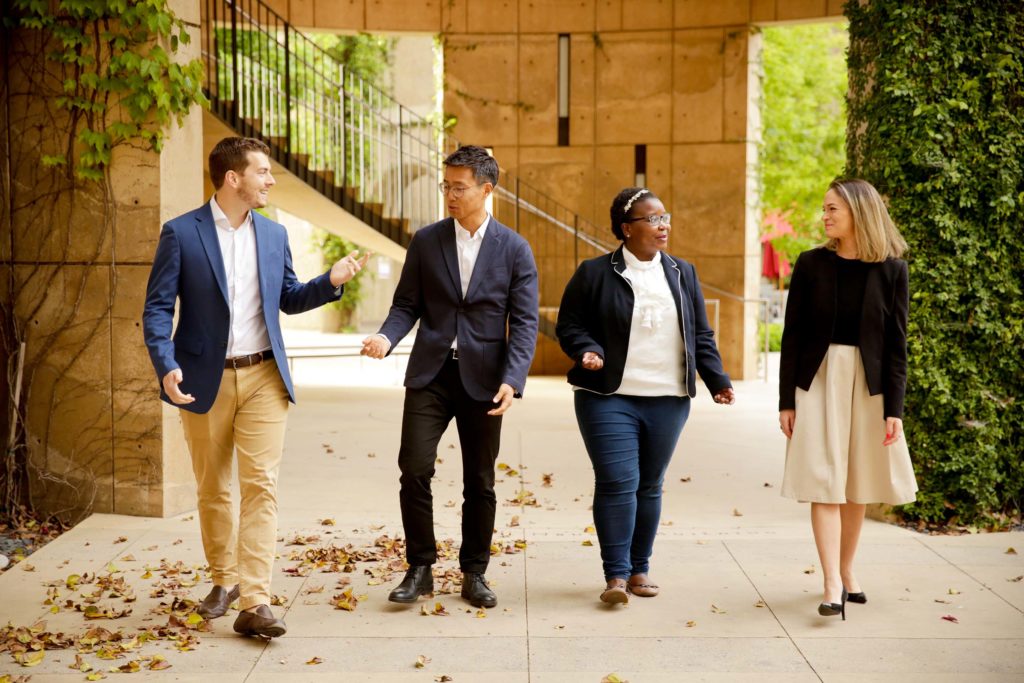
Daines explains that when he started discussing an international program with Magill, it became clear there was a lot of student interest in the weeklong international field study trips to Brazil, China, and elsewhere that were introduced in 2014, but that a week wasn’t long enough. At the same time, interest in the quarter-long international exchange programs that Stanford Law offers with seven top-tier schools throughout the world is limited. So, they looked for a middle ground. The new Global Quarter is the result. It will start with a focus on Asia and then possibly rotate to other areas of the world in subsequent years.
“This is an introduction, but with that new perspective, they should know how to begin—what questions to ask, how to listen and engage,” Daines says.
Jenny Martinez, who became the Richard E. Lang Professor of Law and Dean of Stanford Law School in April, worked closely with Magill and Daines on the Global Initiative, launched five years ago. She co-taught the first International Business Transactions, Regulation and Litigation class. She also led one of the first international field study trips to the International Criminal Court, where she introduced students to her old stomping ground at The Hague, leveraging her early career position with Judge Patricia Wald on the International Criminal Tribunal for the former Yugoslavia. The experience led her to a career in international law but also highlighted the deficit in her own legal education.
“It was also eye-opening—working with lawyers from around the world and hearing their different perspectives and learning about their different legal systems. I felt my legal education had been missing a big chunk. That I could finish law school and know so little about the legal systems in other countries was troubling,” she says. “I learned that lawyers from other countries routinely have a much broader base of knowledge about international and comparative law than is typical—or has been typical—for U.S.-trained lawyers.”
“Our graduates will have an educational experience that reflects the global world we live in, and they will be ready to lead in an increasingly complex and borderless world.”
M. Elizabeth Magill, former Stanford Law School Dean
Early in his career, Curtis Milhaupt, professor of law, began his legal practice in Tokyo—an experience that led to his scholarly focus on Asia. Today, he is a world-renowned expert in the legal systems of East Asia (primarily Japan), state capitalism (primarily China), and comparative corporate governance (click this link for more on his scholarship). He joined the Stanford Law faculty in 2018 after a two-decade long career on the faculty at Columbia Law School. Magill and Daines quickly recruited him to help shape the Franke Program—and he is now charged with developing and leading the seminar on global law and business and the three-week field study trip to Asia, which is designed as an experiential learning experience. Students will work with their peers at universities in China and Japan, engaging with them “in role”—taking the part of, for example, the in-house attorney and working on teams to problem solve key elements of case studies—simulating negotiations, navigating government inquiries, and advising boards on activist shareholders.
“I am particularly excited about the experiential aspect of the Franke Program,” says Milhaupt. “And it will give us an opportunity to reflect on the range of skills and knowledge needed to excel in a cross-border transactional practice.”
Milhaupt describes cultural competence as a buzzword, but a necessity for legal practice in today’s global world. It’s also a key objective of the seminar and trip.
“It’s really fundamental to a well-rounded legal education today for students to have exposure to non-U.S. legal systems and to begin developing sensitivity to the fact that clients, foreign counsel, and others they are going to be dealing with in their professional lives have very different training and approaches to law. This also has the major benefit of sensitizing students to the many ways in which the U.S. legal system is distinctive,” he says.
It didn’t take much to convince Jyra Bickham, JD ’20, of the importance of guided study with a faculty member like Milhaupt in Asia. Before coming to Stanford Law, she was a consultant with Deloitte, where she worked on cross-border deals with teams in Brazil, Mexico, and Germany. She arrived on campus knowing she wanted to focus on business law in the international context.
She applied to be a Franke Fellow for a number of reasons, but the international experience and transactional coursework were high on the list. “You can’t necessarily be equipped and become an expert on how every country handles a business deal, but I think having an international experience at least allows you to acknowledge that you should be aware that how other countries conduct business is different from our own,” says Bickham.

Franke Fellows Craig Maughan, JD ’21, Aletha Smith, JD ’20, and Jyra Bickham, JD ’20
While the trip will be an incredible learning experience, Bickham is also looking forward to the coursework, which will include extensive case studies developed in partnership with leading legal practitioners and business people.
One such class is Accounting, taught by Colleen Honigsberg, assistant professor of law, who joined Stanford Law in 2016. Honigsberg’s research is focused on the empirical study of corporate and securities law. During the class, she’ll be looking at a critical, if little noticed, issue that has recently come to light in securities filings: international auditing. She explains that until 2017, companies publicly traded on U.S. exchanges were not required to disclose the percentage of audit work carried out in other countries. This is significant because in the world of big multinational audits, companies rely on audits performed by third parties in host countries, but those countries may not allow full access to the backup documentation—as is the case with China—putting U.S. companies’ filings at risk.
“It’s a fairly new issue, since we haven’t had the transparency to see how much of a company’s filing might be at risk. But now that we have that transparency, I expect the issue to become increasingly important,” she says. “Looking at this and other issues will help our students to think about challenges they should be on the lookout for when practicing internationally—questions they might ask about business practices in a given country and how they vary from those in the U.S. They need to know what questions to ask.”
Douglas Melamed was leading an exercise in a recent International Business Transactions, Regulation, and Litigation class, with students looking at the challenges for a hypothetical networking company as it wrestled with a decision to invest in high-end manufacturing in China, which risked IP theft. By the end of the class, students had parsed through a grid of possible ways forward—all with positives and negatives. This is the world of the general counsel of an international technology company, something that Melamed knows a thing or two about. Melamed, a professor of the practice of law at Stanford since 2015, practiced law for 43 years, including as senior vice president and general counsel of Intel Corporation from 2009 until 2014. He has co-taught this class since arriving at Stanford as the Herman Phleger Visiting Professor in 2014. His teaching is informed by his experience in practice, which included challenges created when IP is used not just to start companies but as a weapon to disadvantage competitors.
“Markets are becoming global, and intellectual property therefore becomes part of the global strategy,” he says. “That means you have to get patents not just in the country where you create your invention, but in other commercially important countries as well. So, patenting becomes a global business.”
This kind of insight struck Aletha Smith when she visited Stanford Law for Admit Weekend and sat in on Melamed’s class—and signed up to take it the next year.
“What I really liked was the hands-on case study approach where we thought through problems as if we were lawyers and looked at issues from the client’s perspective. I think it is more relevant to corporate law, which is what I plan to practice—weighing options and thinking about the different potential courses of action and recommending options with a risk analysis for your client.”
Smith has had her sights set on an international career almost since the beginning of her education. By the time she graduated from her undergraduate studies, she had lived in Germany, Italy, and Qatar—immersing herself in the language and culture of each. She also interned at a law firm in Brazil—gaining fluency in Portuguese and an appreciation of the country’s growing importance on the world stage.

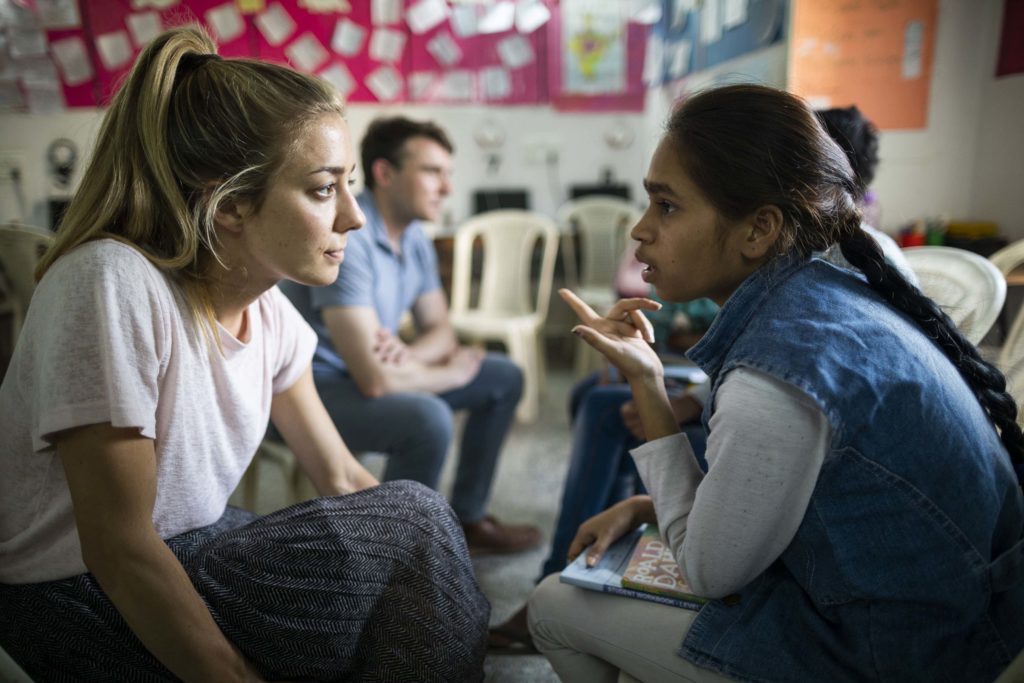
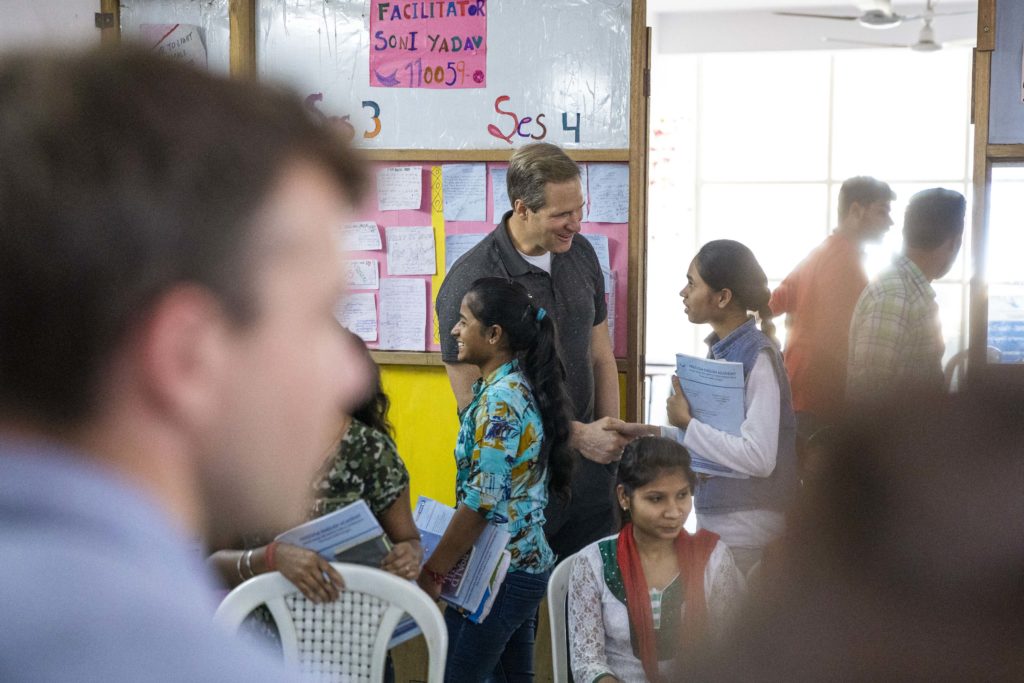
Stanford Law students and faculty on a recent field study trip to India.
Top left photo: Professor Erik Jensen, Research Fellow Dinsha Mistree, and SLS students walking with members of the Aam Aadmi Party after a meeting; Top right photo: Professor Robert Daines meeting students at the Freedom English Academy before a working session; Bottom left photo: Catherine Porto, JD ’19, also at the Freedom English Academy
Craig Maughan, JD ’21, also spent time outside of the U.S. before entering law school—in Brazil for two years doing volunteer work for his church. An electrical engineering undergrad who plans to work in business and technology law, he too is an inaugural Franke Fellow.
“Learning how attorneys work in different countries is very important. And so is looking at how policy influences business for Americans working abroad and vice versa,” he says. “Understanding Asia in particular is crucial for my career. We see Asian markets developing rapidly, so it would be helpful to have some exposure to that global business genre.”
As preparation for his career, Maughan has been reaching out to in-house counsel for advice.
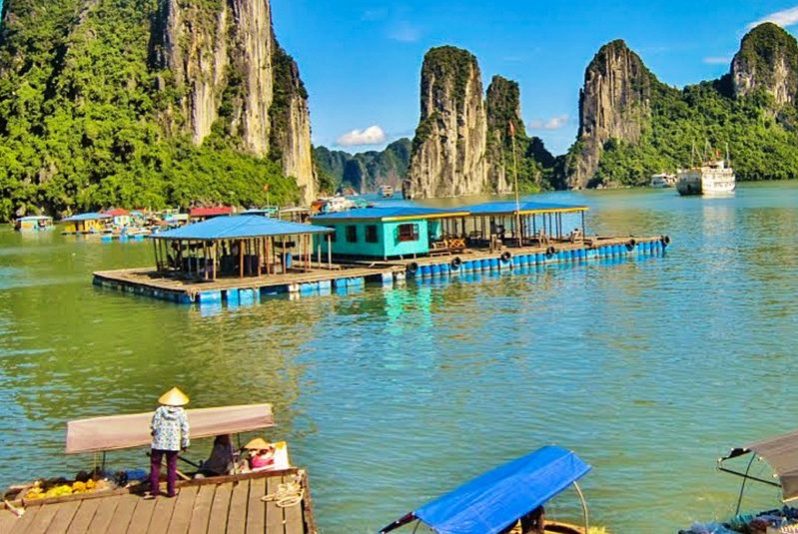
“I’ve spoken with attorneys at Google and Apple and Microsoft—all have recommended that I get this kind of experience—direct exposure to international client issues,” he says.
One former in-house GC, Michael Callahan, now executive director of the Rock Center for Corporate Governance and a professor of the practice of law at SLS, has been working closely with Milhaupt and Daines on the field study component of the Global Quarter.
As general counsel of LinkedIn (2014–2018), Callahan was part of the team that launched the social network in China, securing its license to operate, setting up its business, and hiring a team on the ground for legal and public policy. Callahan had some experience with China to fall back on. He had served as GC of Yahoo from 2003 through 2012, when the company operated Yahoo China, ultimately selling Yahoo China to Alibaba and investing in what is now one of China’s biggest internet companies.
“I think one of the most important aspects of doing business in China, whether as a Chinese company or a foreign company, is in government relations. It’s critical and has to be top of mind, particularly in the technology space,” he says.
Callahan will share his experiences with the Franke Fellows, accompanying Milhaupt and other faculty members on the China leg of the field study trip. He’ll help students work through regulatory, public policy, and legal business issues that come largely from the general counsel perspective.
“China has seen incredible success with its homegrown companies—Alibaba, Tencent, Baidu. In the next 10 years, those companies will become more and more global. Students who understand the importance of how China works, when the market really goes global, will have a valuable tool in their educational arsenal.”
“That I could finish law school and know so little about the legal systems in other countries was troubling.”
Jenny S. Martinez, Richard E. Lang Professor of Law and Dean
Brent Irvin, JD ’03, knows about the importance of global experience that Stanford Law JDs will gain from the W.A. Franke Global Law Program. He remembers his first trip to China in 1992. “Flying into Beijing, the entire city was dark,” he recalls. “I think there was one Western restaurant.” Irvin was an undergraduate with no real interest in China, but the trip instilled in him a new passion. “I sort of got the bug,” says Irvin, who went on to earn an MA in Chinese history and was planning to stay on for his PhD. In 1995 during a second trip to Beijing, he visited friends who were working in the rapidly developing city, and something clicked. “There was just so much going on, so much happening. It sounds like a cliché, right, but it was like living history. I decided not to follow through on the PhD because I had to stay and be a part of it all.”
Irvin remained in China for three years, working at one of the first Sino-foreign joint venture hospitals, immersing himself in the language and culture before entering law school. As the general counsel of Tencent for the past 10 years, Irvin has helped grow the Chinese startup into one of the world’s largest tech companies.
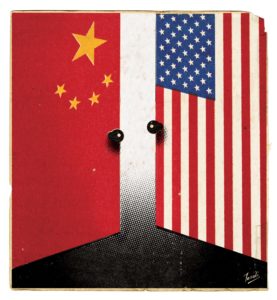
“You can’t say you’re educating your students when they have no concept of and literally no idea about what’s happening in a huge part of the world,” Irvin says. And while his experience is primarily related to China, his work is international, much of it in India these days. “It’s important for JDs to get exposure to international, generally.”
Yanping Cao, JD ’97, one of the few Chinese nationals to receive a Stanford JD, sees the value of multicultural exchange working for both American students but also those who will interact with Stanford Law students while they are abroad. “The American legal education has helped me to look at issues more critically and ask questions,” says Cao, who was recruited to General Electric in 2008 and now serves as general counsel overseeing its six lines of business in China. “In the same way, it will be very useful for Stanford Law students to learn more about the legal issues and business cultures of other countries. Not being international is no longer an option for legal practice in either large companies or firms.” Cao hopes that the Franke Program and Global Quarter will be the start of Stanford Law students’ international exploration, not the end.
Martinez, who began her deanship in April, agrees. “What we do in law school, or what we’ve traditionally done, is teach people how to think like a lawyer and how to spot issues—how to analyze problems, how to acquire information—because when they go out into their careers, that’s what they’re going to do. In this program, we’re trying to do the same thing—we’re trying to get them to think like global lawyers. That is, what are the questions you should be asking? What are the ways to think about these problems so that when you encounter a new legal issue, or country you haven’t worked in before, you know the questions to ask and things not to assume, so that you can, on the ground, adapt and figure it out,” she says.


